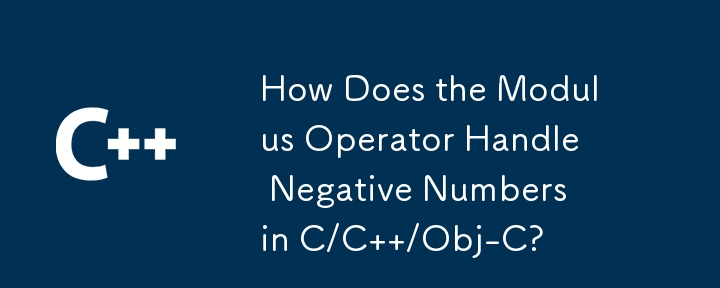How Does the Modulus Operator Handle Negative Numbers in C/C /Obj-C?
Nov 08, 2024 am 03:56 AM
Modulus Operator Handling Negative Numbers in C/C /Obj-C
Unlike in mathematics, the modulus operator (%) in C-derived languages exhibits inconsistent behavior when applied to negative numbers. This discrepancy arises from the ambiguity surrounding the sign of the remainder.
Implementation-Defined Behavior
According to the C 03 standard, the sign of the remainder when both operands are negative is implementation-defined. This means that different compilers and platforms may produce varying results for operations such as (-1) % 8 and fmodf(-1, 8).
Reliable Expression
Regardless of the implementation, the following expression holds true:
(a / b) * b + (a % b) == a
This expression states that the dividend (a) can be reconstructed from the quotient (a / b) and the remainder (a % b).
Solution
One approach to ensure consistent behavior for negative operands is to calculate the remainder as follows:
<code class="cpp">int mod(int a, int b) {
if (b < 0)
return -mod(-a, -b);
int ret = a % b;
if (ret < 0)
ret += b;
return ret;
}</code>
This function handles negative operands by negating both operands in case b is negative. The remainder is calculated as a % b. If the remainder is negative, it is adjusted by adding the absolute value of b. This ensures that the result is a non-negative remainder that satisfies the abovementioned reliable expression.
In this way, mod(-1, 8) would return 7, and mod(13, -8) would return -3, adhering to the expected mathematical behavior.
The above is the detailed content of How Does the Modulus Operator Handle Negative Numbers in C/C /Obj-C?. For more information, please follow other related articles on the PHP Chinese website!

Hot AI Tools

Undress AI Tool
Undress images for free

Undresser.AI Undress
AI-powered app for creating realistic nude photos

AI Clothes Remover
Online AI tool for removing clothes from photos.

Clothoff.io
AI clothes remover

Video Face Swap
Swap faces in any video effortlessly with our completely free AI face swap tool!

Hot Article

Hot Tools

Notepad++7.3.1
Easy-to-use and free code editor

SublimeText3 Chinese version
Chinese version, very easy to use

Zend Studio 13.0.1
Powerful PHP integrated development environment

Dreamweaver CS6
Visual web development tools

SublimeText3 Mac version
God-level code editing software (SublimeText3)

Hot Topics
 C Polymorphism : is function overloading a kind of polymorphism?
Jun 20, 2025 am 12:05 AM
C Polymorphism : is function overloading a kind of polymorphism?
Jun 20, 2025 am 12:05 AM
Yes, function overloading is a polymorphic form in C, specifically compile-time polymorphism. 1. Function overload allows multiple functions with the same name but different parameter lists. 2. The compiler decides which function to call at compile time based on the provided parameters. 3. Unlike runtime polymorphism, function overloading has no extra overhead at runtime, and is simple to implement but less flexible.
 What Are the Different Kinds of Polymorphism in C ? Explained
Jun 20, 2025 am 12:08 AM
What Are the Different Kinds of Polymorphism in C ? Explained
Jun 20, 2025 am 12:08 AM
C has two main polymorphic types: compile-time polymorphism and run-time polymorphism. 1. Compilation-time polymorphism is implemented through function overloading and templates, providing high efficiency but may lead to code bloating. 2. Runtime polymorphism is implemented through virtual functions and inheritance, providing flexibility but performance overhead.
 C : Is Polymorphism really useful?
Jun 20, 2025 am 12:01 AM
C : Is Polymorphism really useful?
Jun 20, 2025 am 12:01 AM
Yes, polymorphisms in C are very useful. 1) It provides flexibility to allow easy addition of new types; 2) promotes code reuse and reduces duplication; 3) simplifies maintenance, making the code easier to expand and adapt to changes. Despite performance and memory management challenges, its advantages are particularly significant in complex systems.
 C Destructors: Common Errors
Jun 20, 2025 am 12:12 AM
C Destructors: Common Errors
Jun 20, 2025 am 12:12 AM
C destructorscanleadtoseveralcommonerrors.Toavoidthem:1)Preventdoubledeletionbysettingpointerstonullptrorusingsmartpointers.2)Handleexceptionsindestructorsbycatchingandloggingthem.3)Usevirtualdestructorsinbaseclassesforproperpolymorphicdestruction.4
 Polymorphism in C : A Comprehensive Guide with Examples
Jun 21, 2025 am 12:11 AM
Polymorphism in C : A Comprehensive Guide with Examples
Jun 21, 2025 am 12:11 AM
Polymorphisms in C are divided into runtime polymorphisms and compile-time polymorphisms. 1. Runtime polymorphism is implemented through virtual functions, allowing the correct method to be called dynamically at runtime. 2. Compilation-time polymorphism is implemented through function overloading and templates, providing higher performance and flexibility.
 What Are the Various Forms of Polymorphism in C ?
Jun 20, 2025 am 12:21 AM
What Are the Various Forms of Polymorphism in C ?
Jun 20, 2025 am 12:21 AM
C polymorphismincludescompile-time,runtime,andtemplatepolymorphism.1)Compile-timepolymorphismusesfunctionandoperatoroverloadingforefficiency.2)Runtimepolymorphismemploysvirtualfunctionsforflexibility.3)Templatepolymorphismenablesgenericprogrammingfo
 C tutorial for people who know Python
Jul 01, 2025 am 01:11 AM
C tutorial for people who know Python
Jul 01, 2025 am 01:11 AM
People who study Python transfer to C The most direct confusion is: Why can't you write like Python? Because C, although the syntax is more complex, provides underlying control capabilities and performance advantages. 1. In terms of syntax structure, C uses curly braces {} instead of indentation to organize code blocks, and variable types must be explicitly declared; 2. In terms of type system and memory management, C does not have an automatic garbage collection mechanism, and needs to manually manage memory and pay attention to releasing resources. RAII technology can assist resource management; 3. In functions and class definitions, C needs to explicitly access modifiers, constructors and destructors, and supports advanced functions such as operator overloading; 4. In terms of standard libraries, STL provides powerful containers and algorithms, but needs to adapt to generic programming ideas; 5
 C Polymorphism: Coding Style
Jun 19, 2025 am 12:25 AM
C Polymorphism: Coding Style
Jun 19, 2025 am 12:25 AM
C polymorphismisuniqueduetoitscombinationofcompile-timeandruntimepolymorphism,allowingforbothefficiencyandflexibility.Toharnessitspowerstylishly:1)Usesmartpointerslikestd::unique_ptrformemorymanagement,2)Ensurebaseclasseshavevirtualdestructors,3)Emp






